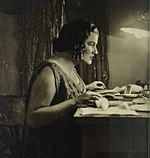How to Pronounce Viorica Ursuleac
#50
Most Popular
Boost
Mar 26, 1894 Chernivtsi, Chernivtsi Oblast, Ukraine Died on 22 Oct 1985 (aged 91)
Romanian operatic soprano
AriesViorica Ursuleac, Date of Birth, Place of Birth, Family, Facts, Age, Net Worth, Biography and More in FamedBorn.com

Romanian operatic soprano
Aries